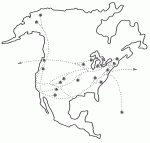1990 Data Managers Workshop
The LTER Data Managers held their annual workshop in Snowbird, Utah, July 26-28, 1990 prior to the Ecological Society of America meetings. All 17 sites were represented. A unique aspect of the workshop was the large number of returning data managers. The low turnover in personnel this year is a positive indication of the strength of commitment to managing research information across the Network.
At the initial evening session, data managers gave short presentations on recent developments at their sites.
Additional reports were given on the fall ‘89 and spring ‘90 LTER Coordinating Committee meetings, the KBS Workshop on Data Management at Inland and Coastal Field Stations, the Connectivity Report, the Core Dataset Catalog (Both text and on-line), the All Scientists Meetings, and the GIS Committee, among other topics.
The second day began with a review of the accomplishments of the 1989 workshop, followed by a discussion of the current state of site data management, and new directions and initiatives for LTER data management at the network level. Following the format of last year’s workshop, participants selected specific issues for discussion in working groups. Results and recommendations of the groups were later synthesized by all participants into the following priority items and finalized in written reports:
- Outreach to the larger ecological research community
- An international symposium on issues of data management
- A pilot project for an LTER climate database
- A workshop on standardization issues related to GIS, remote sensing, and management of ecological datasets
Additional working groups focused on issues of proprietary rights and data sharing, packages for ecological databases, the use of networks in database management, managing metadata (i.e., descriptive data), sharing models and software, optical disk storage media, and intersite data exchange formats. Other tasks of the group were to outline an initial agenda for the 1991 Data Managers Workshop and identify a Data Managers Task Force for 1990. The 1990 Task Force: Barbara Benson, NTL; James Brunt, SEV; William Michener; Rudolf Nottrott, NET; John Porter, VCR; and Susan Stafford, AND.
Representatives from organizations outside the LTER Network gave presentations on the final day. John Pfaltz of the Institute for Parallel Computation, University of Virginia, spoke on the differences and commonalities between scientific and commercial databases. Walt Conley of the Department of Biology, New Mexico State University, discussed Parknet, the U.S. Department of Energy’s (DOE) network of six ecological research sites, and suggested areas of possible cooperation with the LTER Network. A detailed report on workshop proceedings, with recommendations, will be available at the LTER All Scientists meeting in September.
Core Datasets Catalog
Work on the LTER Core Dataset Catalog is proceeding on schedule. The sites have submitted final drafts of their catalog entries to William Michener, coordinator of the effort. The final version of the Catalog will be available this fall both in hardcopy form and on-line at LTERNET.
Draft versions of the files representing the Catalog entries are already on-line at LTERNET both in ASCII text and WordPerfect format. They are in the public directory ~ftp/catalog. The possible access methods include anonymous file transfer (FTP) over the Internet (host, “lternet.washington.edu”; Internet address, ‘128.95.36.1’), with automatic mail reply for subsets of the files to be enabled later. The files are presently stored on a per-site basis. More files to be added shortly include a subject index, an investigator index, site abstracts and a reference guide.
Bulletin Board Now Accessible
VUI, the screen-oriented bulletin board for the new LTERNET Bulletin Board (see spring ‘90 Network News) is now publicly accessible. For detailed information on how to access and operate the bulletin board, send any message to:
“helpBB@lternet.washington.edu” or “helpBB@lternet.Bitnet”
For more general assistance send any message to:
“help@lternet.washington.edu” or”help@lternet.Bitnet”
LTERNET Upgrade
LTERNET communications capacity has been upgraded. LTERNET is now connected via a nodal switching system directly to the NSFNET backbone, allowing Internet file transfers to and from LTERNET at maximum speeds up to the limit of 1.54 megabits/second.
The LTERNET dial-in connection has been upgraded to a 2400 bits/second (bps) reliable connection with error correction. With data compression, this allows file transfers at speeds close to 4800 bps. The modem will recognize the speed of the incoming connection and automatically adjust. For detailed instructions send any message to: “dial@lternet.washington.edu”
LMER Sites Join LTERNET
Three LMER sites have joined the LTERNET electronic mail forwarding system: Columbia River Estuary Turbidity Maxima (CRETM), Tomales Bay Biogeochemical Reactions in Estuaries (BRIE), and Waquoit Bay. To obtain a list of the individual researchers at these sites, send any message to: “groups@lternet.washington.edu”

 Enlarge this image
Enlarge this image